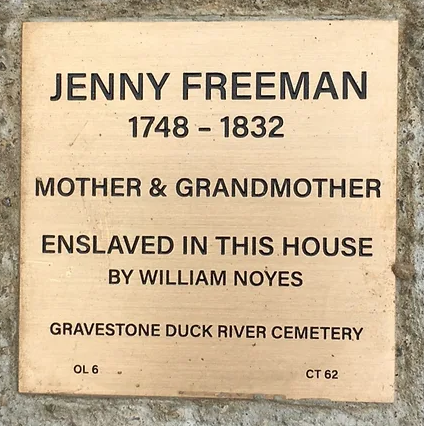
A scrapbook page listing those enslaved by William Noyes states that Jenny Freeman died Dec. 7th, 1832, in Lyme, in the 80th year of her age, of cancer. It notes that she was the wife of Prince Freeman, who died at sea in 1791, and identifies their five children, several grandchildren, and a great-grandson. A gravestone in Duck River Cemetery confirms the date of Jenny’s death.
Nothing is known about Jenny’s childhood, but as a young mother, she likely served in the house that stood on the site of today’s Florence Griswold Museum. She may well have lodged with her family in the attic of the kitchen ell, but whether she moved to the larger house that William Noyes built next door in about 1784 is not known. Her younger daughter Crusa likely remained enslaved in the older dwelling until 1816, when it was moved by ox team a mile down the road to the corner of today’s Beckwith Lane. By then Jenny was 64.
An emancipation certificate has not been found, but because of her age and because her ownership during half a century of enslavement passed within the Noyes family, Jenny was likely freed informally. A Noyes family letter describing the death of her son Prince Freeman in 1826 suggests that she spent her later years in the household of Dr. Richard Noyes, a grandson of her enslaver. More than 40 years after she died, Richard’s cousin Ellen Noyes Chadwick, in notes on family history, recalled “old black Jenny” and described her as “a good Christian woman.”
Chadwick included Jenny’s small black teapot and black ivory heart-shaped knitting sheath in an exhibition to celebrate the country’s centennial at Lyme’s new Pierpont House Hotel in September 1876. A Hartford Courant reporter remarked that Jenny’s teapot, amid a display of fine china, served as an important reminder of Connecticut’s slave-owning past.